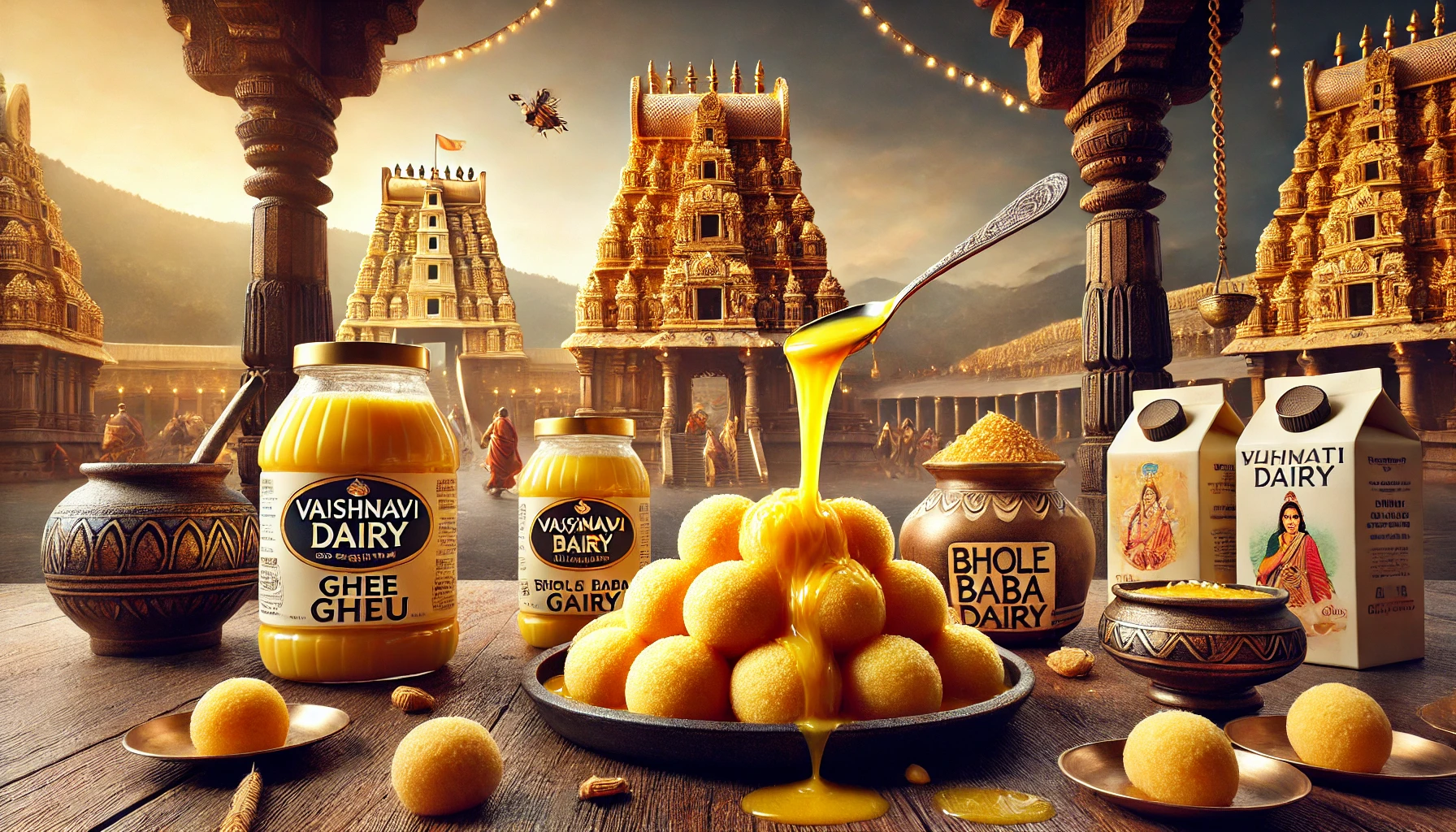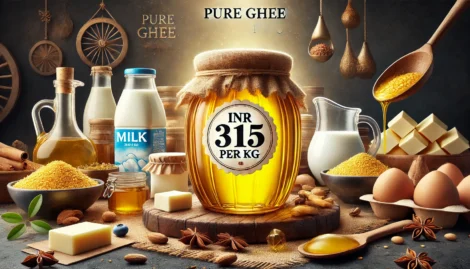- You have no items in your shopping cart
- Subtotal: ₹0.00

Role of Sri Vyshnavi Dairy and Bhole Baba Organic Dairy in Tirupati Laddu Ghee
The sacred Tirupati Laddu is not just a sweet, but a spiritual offering that millions of devotees consume with deep reverence. However, the recent scandal involving adulterated ghee has raised significant concerns about the purity of this offering. The investigation carried out by the Special Investigation Team (SIT) has unveiled troubling details involving Sri Vyshnavi Dairy and Bhole Baba Organic Dairy, highlighting a serious breach in the supply chain that compromises the quality and integrity of the ghee used in preparing the laddus.
Background of the Tirupati Laddu Controversy
The controversy began when suspicions arose about the quality of ghee used in preparing the laddus offered at the Tirumala Tirupati Devasthanams (TTD). Reports of adulterated ghee led to an investigation, which revealed that trucks carrying the ghee did not originate from the purported source, AR Dairy, as originally thought. Instead, the ghee was found to be coming from Sri Vyshnavi Dairy, located in Tirupati. Upon further investigation, it was discovered that Sri Vyshnavi Dairy had not produced the ghee itself but had procured it from Bhole Baba Organic Dairy Pvt Ltd, based in Uttarakhand.
The findings by the SIT revealed several discrepancies in the supply chain, causing public outrage and raising questions about the trustworthiness of the dairies involved. The involvement of Sri Vyshnavi Dairy and Bhole Baba Organic Dairy has led to widespread concern about the practices employed by these suppliers, and the controversy has shed light on the broader issue of adulteration in the food supply chain.
Sri Vyshnavi Dairy’s Role in the Controversy
Sri Vyshnavi Dairy, a prominent supplier in the Tirupati region, was found to be the origin point for the trucks carrying the ghee used in the Tirupati laddus. However, as the investigation unfolded, it was discovered that Sri Vyshnavi Dairy had not actually produced the ghee, but had instead procured it from Bhole Baba Organic Dairy. This raised concerns about the transparency and quality control measures at Vaishnavi Dairy.
The SIT report revealed that the ghee provided by Sri Vyshnavi Dairy was adulterated with foreign fats, including vegetable oils and animal fats. This adulteration was confirmed through an S-value analysis conducted by the NDDB CALF Lab in Anand, Gujarat. The S-value test, which measures the purity of ghee, showed significant deviations from the standard values expected for pure ghee, indicating the presence of adulterants.
The involvement of Sri Vyshnavi Dairy in this controversy has raised questions about the company’s sourcing practices and the lack of stringent quality checks. For a company entrusted with supplying ghee for such a sacred purpose, the breach in trust is significant, and the public outcry has been swift.
Bhole Baba Organic Dairy’s Involvement
Bhole Baba Organic Dairy Pvt Ltd, based in Uttarakhand, was identified as the original producer of the adulterated ghee. Bhole Baba Organic Dairy has long been associated with the production of dairy products, and its association with Sri Vyshnavi Dairy in this case has come under scrutiny. The fact that both dairies share the same directors further complicates the situation, as it raises concerns about potential conflicts of interest and the transparency of their operations.
The SIT report highlighted that the ghee supplied by Bhole Baba Organic Dairy was found to be of substandard quality and adulterated with foreign substances. This has called into question the credibility of Bhole Baba Organic Dairy and its commitment to producing high-quality, pure ghee. The discovery of adulteration in a product meant for religious offerings is a serious offense, and the implications for the company are far-reaching.
The Importance of Sourcing Ghee from Authentic Suppliers
The Tirupati Laddu controversy has brought to light the critical importance of sourcing ghee from authentic and reputable suppliers. Ghee, when produced using traditional methods, is a pure and nutritious product that holds immense cultural and religious significance. However, the involvement of companies like Sri Vyshnavi Dairy and Bhole Baba Organic Dairy in the supply of adulterated ghee underscores the risks associated with mass production and the use of intermediaries.
In religious contexts, the purity of ghee is paramount. Devotees consume the laddus offered at the Tirumala temple with the belief that they carry divine blessings. The use of adulterated ghee in such offerings not only compromises the spiritual significance of the laddus but also poses health risks to those who consume them.
Why You Should Buy Ghee from Authentic Sources
In light of the Tirupati Laddu controversy, it is more important than ever to ensure that the ghee you purchase comes from a trusted and authentic source. Authentic ghee is made using traditional methods, such as slow cooking and hand-churning, which preserve its natural nutrients and flavor. In contrast, mass-produced ghee is often subjected to heat and chemical processes that strip it of its nutritional value and can lead to adulteration with foreign substances.
Here are a few reasons why buying ghee from authentic sources is essential:
- Purity and Quality: Authentic ghee is made from pure milk, without the addition of preservatives, chemicals, or foreign fats. This ensures that the ghee retains its natural nutritional value and flavor.
- Health Benefits: Ghee is rich in essential vitamins and fatty acids, which provide numerous health benefits. However, these benefits can only be realized if the ghee is pure and unadulterated. Adulterated ghee, on the other hand, can pose health risks and may contain harmful substances.
- Spiritual Significance: In Hindu rituals, ghee is often used as an offering to deities, and its purity is of utmost importance. Offering impure ghee can compromise the spiritual value of the ritual and diminish its effectiveness.
- Supporting Traditional Methods: By purchasing ghee from authentic sources, consumers support traditional methods of production that prioritize quality over quantity. This helps to preserve cultural heritage and ensures that the ghee you consume is of the highest quality.
The Health Risks of Adulterated Ghee
The adulteration of ghee with foreign fats, as seen in the Tirupati Laddu controversy, can have serious health implications. Adulterants such as vegetable oils and animal fats can introduce harmful substances into the ghee, which can negatively impact health. For example, the consumption of adulterated ghee can lead to an increase in cholesterol levels, which can contribute to heart disease and other cardiovascular issues.
In addition to the health risks, adulterated ghee may also contain harmful chemicals and preservatives that can cause long-term damage to the body. The use of such substances in a product that is meant to be pure and nutritious is a violation of consumer trust and can have serious consequences for public health.
Ensuring the Purity of Ghee
To avoid the risks associated with adulterated ghee, it is essential to purchase ghee from trusted suppliers who adhere to strict quality control measures. Look for ghee that is made using traditional methods and is free from additives, preservatives, and foreign fats. Additionally, check for certifications that verify the purity of the ghee, such as an S-value test or other quality assurance measures.
Conclusion
The Tirupati Laddu controversy involving Sri Vyshnavi Dairy and Bhole Baba Organic Dairy has highlighted the importance of sourcing ghee from authentic and reliable suppliers. The adulteration of ghee used in religious offerings is a serious offense that not only compromises the spiritual significance of the offering but also poses health risks to consumers. As a result, it is more important than ever to ensure that the ghee you purchase is of the highest quality and free from adulterants.
By supporting authentic suppliers who prioritize quality and purity, consumers can enjoy the numerous health benefits of ghee while also ensuring that their religious offerings are accepted by the deities. In a world where mass production and profit margins often take precedence over quality, it is crucial to remain vigilant and choose products that are made with care and integrity.



